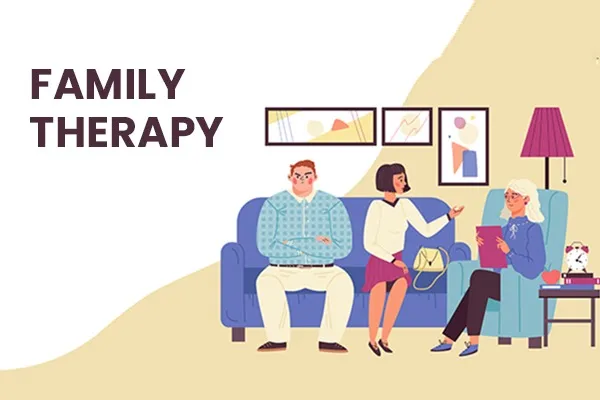
Family Therapy
Family therapy focuses on understanding relationships rather than treating individuals in isolation. It brings relatives together to resolve conflict, rebuild trust and support emotional well-being. By identifying harmful patterns, families learn healthy communication and empathy. A trained family therapist guides sessions to encourage cooperation, mutual respect and emotional healing as a united team.
Understanding How Family Therapy Works
Family therapy helps families identify recurring behaviour patterns that lead to misunderstandings or tension. A family counsellor observes interactions, highlights emotional triggers and teaches active listening without judgment. This process improves problem-solving, fairness and shared responsibility. Over time, members learn healthier ways to communicate, handle stress and manage everyday family challenges together.
What Happens During Family Counselling?
In each family counselling session, the therapist encourages open dialogue and helps members express feelings honestly. Through guided discussion, families discover how emotions, values and expectations influence behaviour. Sessions often include exercises that build empathy, emotional awareness and cooperation, allowing members to rebuild trust, repair strained bonds and create a supportive family environment.
Licensed family therapists often combine elements from these approaches to create customised strategies that meet each family’s unique needs, encouraging growth, clarity and unity.
Benefits of Family Counselling
Family counselling offers a range of benefits that improve relationships and overall family well-being:
-
Improved Communication: Families learn to express thoughts and feelings openly and listen to one another effectively.
-
Conflict Resolution: Counselling provides tools to manage disagreements and reduce recurring arguments.
-
Stronger Relationships: Family members build trust, empathy and emotional support for one another.
-
Problem-Solving Skills: Families develop strategies to handle challenges collaboratively.
-
Emotional Healing: Counselling helps members cope with grief, stress or past trauma.
-
Enhanced Cooperation: Families work together more harmoniously, creating a supportive home environment.
-
Sense of Belonging: Members feel understood, valued and connected, strengthening family unity.
By highlighting these benefits, family counselling not only addresses current issues but also equips families with skills for long-term growth and harmony.
When Online Family Therapy Is Most Helpful?
Online family therapy offers flexible access for households separated by distance or busy schedules. Conducted through secure video platforms, these sessions allow open discussion from any location. A licensed family therapist ensures privacy and engagement for all participants. This virtual format maintains consistency, making therapy convenient and effective without compromising professional quality.
Importance of Choosing a Licensed Family Therapist
Working with a licensed family therapist ensures professional care, ethical standards, and effective techniques. These experts understand relationship systems, assess emotional risks and promote safety during therapy. Their qualifications allow them to identify deeper issues and guide change constructively. Families benefit from structured sessions that encourage responsibility, respect and lasting emotional improvement.
Long-Term Benefits of Family Therapy
The long-term benefits of family therapy extend beyond immediate problem-solving. Families often experience deeper connections, fewer arguments and a more peaceful home environment. Children feel supported, while parents regain unity and confidence. Improved communication fosters understanding and empathy, empowering families to handle future challenges calmly and strengthen bonds across generations with resilience.
How Family Therapy Builds Lasting Change?
Family therapy promotes emotional awareness, patience and healthy interaction habits. Families learn to discuss issues without blame and respond to stress collaboratively. Over time, these positive habits replace old conflict cycles. The process nurtures self-awareness, compassion and teamwork, helping families maintain emotional stability and harmony long after therapy sessions have ended.
Professional Support With Mindsy
Mindsy offers professional guidance through experienced RCI-licensed family therapists and counsellors. The service provides both in-person and online family therapy tailored to each family’s needs. Every session focuses on practical progress, emotional well-being and meaningful connection. Mindsy’s compassionate approach combines evidence-based care with empathy, promoting long-lasting positive change in family relationships.
FAQs
What is family therapy and who can attend?
Family therapy involves sessions where relatives meet with a professional to improve relationships, manage conflict and enhance communication. Parents, children and even extended family members can take part, depending on the challenges being addressed.
How long does family therapy usually take?
The length of therapy depends on each family’s situation and goals. Some benefit from short-term sessions lasting a few months, while others prefer longer engagement for continued support and sustained progress.
Are there different types of family therapy?
Yes, therapists may use structural, strategic, systemic or narrative approaches. Each method helps families understand interaction patterns and build new ways to communicate and solve problems that fit their circumstances.
What are the main benefits of family therapy?
The key benefits include improved communication, emotional understanding, stronger problem-solving skills and reduced family tension. It also helps families build trust, share responsibilities fairly and manage future difficulties with confidence.
Can family therapy be done online?
Yes, online family therapy is an accessible option for families living apart or with busy schedules. Sessions are conducted securely through video calls with the same care, structure and confidentiality as in-person meetings.
How does a family counsellor differ from a psychologist?
A family counsellor focuses on relationship dynamics within a household, while a psychologist may address individual mental health issues. Both can work together to ensure emotional wellbeing across all members.
When should a family seek professional help?
Families may benefit from therapy when conflict feels unmanageable, communication breaks down or emotional distance grows. Seeking help early can prevent further stress and support healthier relationships.
